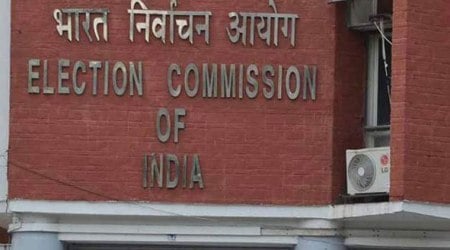 File Photo
File Photo
Kickstarting its first round of external consultations on the Budget announcement of electoral bonds, Finance Ministry officials held a meeting with officials of the Election Commission (EC) on Wednesday, wherein the EC officials flagged concerns related to transparency in the proposed structure of electoral bonds.
The Department of Economic Affairs secretary Subhash Chandra Garg, Central Board of Direct Taxes chairman Sushil Chandra, EC’s director-general Dilip Sharma along with other officials met for a preliminary discussion on the structure of electoral bonds. RBI Deputy Governor B P Kanungo was also expected to participate in the meeting but withdrew owing to the short notice for the meeting.
Officials said the consultation was held to take inputs of the EC and the RBI before finalising the final draft of the electoral bonds. “Representatives of the EC reiterated the concerns related to transparency and money laundering. They have given their views and soon the RBI will also give inputs,” an official said. Also, EC officials raised concerns related to recent amendments in the Representation of the People (RP) Act, which exempts political parties from disclosing donations received through electoral bonds.
“Since RBI officials could not be a part of the meeting, the views of the EC were heard. The EC has raised concerns about exemption for electoral bonds in contribution reports for parties provided under Section 29C (of the RP Act). The EC officials were asked to get back with suggestions, especially for removing the transparency and anonymity-related concerns raised by them,” another official said. Once consultations with the RBI and the EC are over, the draft structure of electoral bonds will be sent for consultations with other political parties, the official added.
In his Budget speech in February, Finance Minister Arun Jaitley proposed steps for cleansing political funding, including a ban on cash donations of over Rs 2,000 to a party from any individual. Also, he had announced the proposal for electoral bonds through which a donor would buy bonds from authorised banks against cheques and digital payments that would be redeemable only in the designated account of a registered political party. Former Chief Election Commissioner Nasim Zaidi, at the time of demitting office earlier this month, had expressed concerns saying that electoral bonds would impact transparency negatively and the poll panel had not been consulted.
Under Section 29C of the RP Act, political parties have to file contribution reports complete with details of donors for any contribution above Rs 20,000. This was amended in the Budget session this year to introduce a proviso and explanation that exempts political parties from disclosing donations received from electoral bonds, even if it is above the prescribed limit.
The government also introduced omission of the first proviso in Section 182 of the Companies Act, 2013, which consequently removed limits on corporate donations to political parties. According to Finance Bill amendments, the previous limit of 7.5 per cent of the average three-year net profit for donations has been removed and companies are no longer required to name the parties to which contributions are made — they will be required to disclose the amount.
